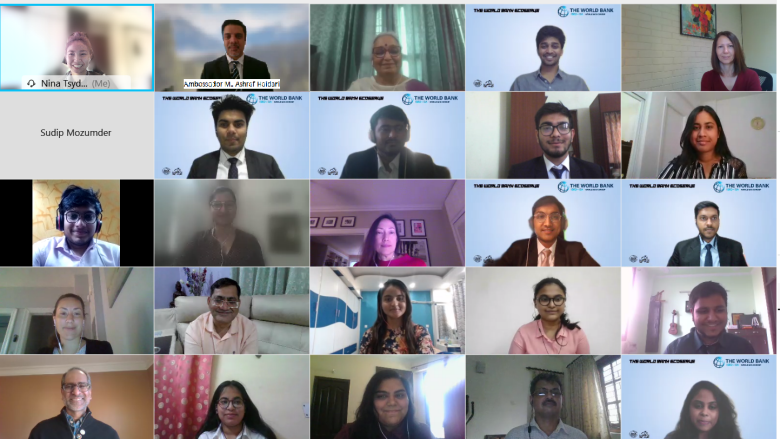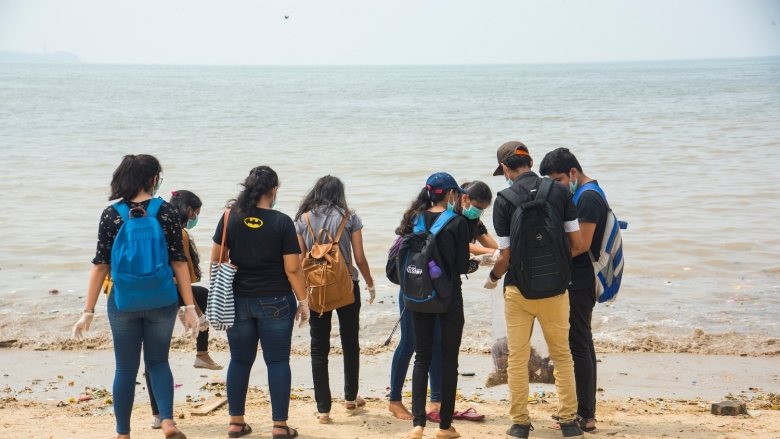Our world’s waters are under threat, with our oceans increasingly becoming a hazardous dumping ground for humankind. Up to 15 million tons of plastics make their way into the Indian Ocean each year. South Asia alone generates 26.7 million tons of plastic waste annually despite being a pioneer in banning single-use plastic bags.
The COVID-19 pandemic has escalated the problem of plastic waste to colossal proportions and these numbers tell the grim tale: Globally, 3.4 billion single-use facemasks/face shields are discarded daily and Asia is projected to throw away 1.8 billion face masks daily, the highest quantity of any continent globally. With this tidal increase of plastic waste and lack of effective solid waste management systems, plastic pollution has become a major challenge across South Asia.
To address this sinking reality, the World Bank invited youth across India to take a deep dive into the problem of mismanaged marine plastic waste and bring innovative solutions to counter the tide. The venue was the Student Entrepreneurship Challenge, a competition held virtually on April 2, 2021 in cooperation with the Indian Institute of Management Lucknow, the South Asia Co-operative Environment Programme (SACEP), and the World Bank’s Youth-to-Youth Global Youth Climate Network (Y2Y-GYCN). This initiative is linked to a broader effort of Plastic-free Rivers and Seas for South Asia (PLEASE), an ambitious $50 million project to fight plastic pollution across all eight countries of South Asia, supported by the World Bank, Parley for the Oceans, and SACEP.
“The Student Entrepreneurship Challenge and a similar ongoing challenge in Bangladesh attest to how a regional competition can unlock the creative potential of young people like you, whose ideas are likely to lead the change we’d like to see tomorrow, today,” said His Excellency M. Ashraf Haidari, Ambassador of Afghanistan to Sri Lanka and Director of SACEP, in his opening remarks.
The Challenge: Rethinking Our Relationship with Plastics
Plastic has many benefits. The plastics industry in India contributes to 8 percent of the country’s GDP, providing 4 million jobs across 30,000 processing units and 2,000 exporters. However, mismanaged plastics pose significant economic and environmental risks.
The Student Entrepreneurship Challenge asked Indian youth to come up with innovations to promote circular economy solutions to deal with plastic waste. Participants were asked to employ the AIR strategy of Avoiding plastics whenever possible; Intercepting harmful materials; and Redesigning of material, methods, and thinking in their entries.
Solutions: Bridging the Gap Between Environment & Poverty
The competition came with one caveat: the innovation had to be a good social enterprise too, with promoting gender equality as one parameter. Also, the competition itself wasn’t all plain sailing for the youth. Through a competitive process of elimination, the initial 750 students, or 300 participating teams from across India, were narrowed down to eight teams who presented their winning ideas to a panel of six expert jurists.

“Frankly, I was blown away,” said Dr. Pawan Patil, Senior Environmental Economist at the World Bank and task team leader for the PLEASE project. “For all of us beyond school now, it was incredibly humbling and rewarding to see how much knowledge and know-how these students had absorbed in such a short period of time…things we have been working on for decades.”
Take Ecopods for example, a solution proposed by first place winners TEAM IOTA. Going dramatically against the tide in the packaging of personal toiletries, the team presented a plastic-free, single-use shampoo, conditioner, and body wash solution via disposable pellets. Keeping an eye on social empowerment, the supply chain model of Ecopods ensured employment to specially abled and widowed women. Ensuring a 37.5 percent reduction in bottled personal shampoos and toiletries and an 80% reduction in CO2 emissions, bottled toiletries might well be water under the bridge if Ecopods were to take off.
From personal toiletries, second place winners TEAM ENACTUS shifted their attention to building real, sustainable toilets with Ecobricks or plastic bottles stuffed with waste, in the rural areas of Bhalswa and Nangloi on the outskirts of Delhi. The model is a win-win on multiple fronts. It is socially conscious, relying on providing work to women to make the bricks. It incentivizes folks to barter plastic bottles for food items like rice and grains. It tackles the issue of sanitization and hygiene to thousands of residents of rural areas where public toilets are rare.
Both Team IOTA and TEAM ENACTUS were invited to present their projects at the second Climate Smart-Entrepreneurship Competition organized by the GCYN this June in Washington, DC. The competition winners will be announced by a jury of senior World Bank management during an awards ceremony on May 13, 2021. In addition, Youth2Youth, will hold its annual World Bank Youth Summit on June, 9-10, 2021 where issues such as climate change will be discussed.
The third place winner TEAM PASSION PAVERS addressed the dirty side of shampoo with ECOZE or zero waste pellets to avoid plastic wrapping for self-care products, pointing out that 40-50% of India’s annual plastic waste of 9.46 tons comes from personal care items.
“I saw an authenticity with these student presentations,” concluded Dr. Patil alluding to the organic, local solutions put forward by the youth. “They reflected the social dimensions of poverty and I am incredibly hopeful for the future.”

